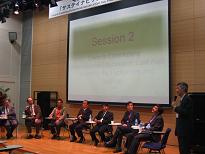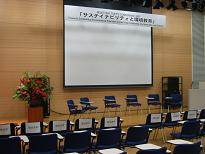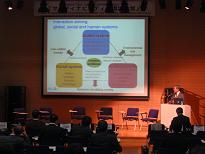第9回東アジア四大学フォーラム東京会議 / BESETOHA
Report on Session Two of the BESETOHA Tokyo Conference 2007 /
MARUYAMA Makoto,Professor of The University of Tokyo
The theme of the second session was “Towards Establishing Environmental Education in East Asia: Integrating the Humanities and Science.” The session was held in the afternoon on November 11th, 2007. It started with the opening address by Professor Keisuke Hanaki (UT) who illustrated the overview of the research and educational system of environmental studies at the University of Tokyo as a whole, especially focused on IR3S (Integrated Research System for Sustainability Science). The second speaker, Professor Takashi Mino (UT) explained the challenging program on environmental studies at the graduate level on Kashiwa campus, emphasizing the importance of “identity, diversity, and experience” for sustainability science. Then the third speaker, Professor Akihiro Sawa (UT) elucidated the newly established NEDO special program for new environmental and energy science at the undergraduate level on Komaba campus. These three speeches gave concrete information on the development of the environmental studies at the University of Tokyo in the past two years.
 Professor Minquan Liu (PKU) spoke about the importance of the notion of Green GDP and Human Development. At the same time, however, he pointed out the danger of heavily depending on the concept of GDP because of its intrinsic tendency toward over-exploitation of the environment. He argued for the concept of GPI (Genuine Progress Index) as alternative to GDP and proposed the necessity to inquire further into Human Development Paradigm in order to evaluate properly the human basic capacities on non-monetary basis.
Professor Minquan Liu (PKU) spoke about the importance of the notion of Green GDP and Human Development. At the same time, however, he pointed out the danger of heavily depending on the concept of GDP because of its intrinsic tendency toward over-exploitation of the environment. He argued for the concept of GPI (Genuine Progress Index) as alternative to GDP and proposed the necessity to inquire further into Human Development Paradigm in order to evaluate properly the human basic capacities on non-monetary basis.
 Professor Jung Wk Kim (SNU) discussed the environmental issues in South Korea from historical perspective and pointed out the environmental degradation, especially deforestation, caused by the industrialization during the Japanese rule since 1910. He emphasized that Koran citizens had been long forced to ignore the danger of such environmental degradation and to pay little attention to the industrial pollution. During the past two decades, Korean public has begun to aware the seriousness of the environmental issue. The new awareness has flourished rapidly due to the democratization during the 1980s and the establishment of environmental NGOs. Professor Kim, however, made a plea for the governmental assistance for developing environmental education not only within schools but also for society as a whole.
Professor Jung Wk Kim (SNU) discussed the environmental issues in South Korea from historical perspective and pointed out the environmental degradation, especially deforestation, caused by the industrialization during the Japanese rule since 1910. He emphasized that Koran citizens had been long forced to ignore the danger of such environmental degradation and to pay little attention to the industrial pollution. During the past two decades, Korean public has begun to aware the seriousness of the environmental issue. The new awareness has flourished rapidly due to the democratization during the 1980s and the establishment of environmental NGOs. Professor Kim, however, made a plea for the governmental assistance for developing environmental education not only within schools but also for society as a whole.
 Professor Phung Xuan Nha (VNU) and Dr. Hoang Van Luan (VNU) illustrated the rapid expansion of the environmental education in Southeast Asia. Whereas they made much of the development of formal education, they pointed out the necessity of encouraging non-formal education, such as vocational education and NGO activities in conjunction with the spreading information through the media. They also addressed the holistic approach in order to solve the discrepancy between natural and social sciences, because too much emphasis has been put on the former whereas little light has been shed on the latter.
Professor Phung Xuan Nha (VNU) and Dr. Hoang Van Luan (VNU) illustrated the rapid expansion of the environmental education in Southeast Asia. Whereas they made much of the development of formal education, they pointed out the necessity of encouraging non-formal education, such as vocational education and NGO activities in conjunction with the spreading information through the media. They also addressed the holistic approach in order to solve the discrepancy between natural and social sciences, because too much emphasis has been put on the former whereas little light has been shed on the latter.
These seven presentations were followed by the panel discussion among the speakers. It was a very good opportunity not only to exchange the most recent information about the development of environmental education in each country but also to make clear the common goal and role of the four universities in terms of environmental education. In spite of no translation services, communication among all speakers was excellent. The speakers exchanged their idea directly and contributed to deepen and enrich the discussion. Although there were not so many audiences, the questions and comments from them were also very keen and valuable.
Last but not least, Dr. Ayako Kimura and her students contributed very much for preparing and organizing the session. Without their assistance, the session would not have been completed with great success.